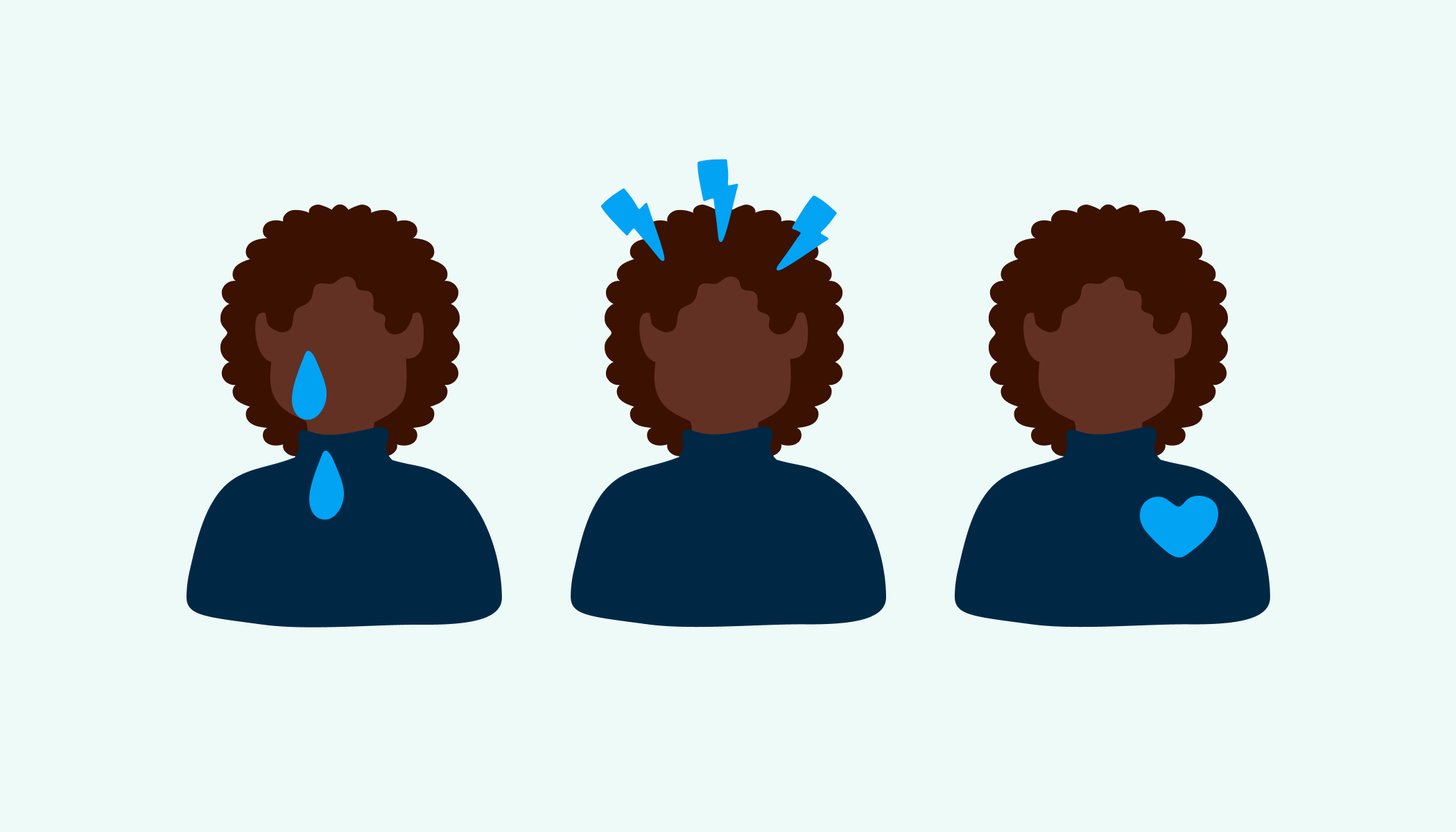Do you ever find that your mood shifts from feeling happy and upbeat to feeling sad or irritable? Mood swings are intense or sudden changes in how you’re feeling – where your mood can change from high to low or low to high.
While it’s normal to feel up and down sometimes, mood changes can be a sign of hormonal fluctuations, physical health problems or lifestyle changes. But some mood changes – especially severe ones – could be due to a mental health condition where you might need extra support or treatment.
What causes mood swings?
While a change in your mood can be triggered by an anxious thought or a stressful event at work, it can also be caused by several factors. Here are some of the most common ones:
1. Premenstrual syndrome
If you notice your emotions are more intense before your period, this could be due to premenstrual syndrome (PMS).
The emotional symptoms of PMS – including mood swings, anxiety, irritability, sadness and anger – are thought to be connected to the changing balance of hormones during your menstrual cycle. The other symptoms of PMS include:
- Bloating or tummy pain
- Breast tenderness
- Headaches
- Skin breakouts
- Trouble sleeping
- Low libido
If your PMS symptoms are interfering with your daily life, it’s a good idea to speak to a doctor. It could be a sign of a more severe form of PMS called premenstrual dysphoric disorder (PMDD).
2. Pregnancy
Your mood can change throughout your pregnancy – and you may find yourself becoming tearful, angry, irritable and moody.
One of the main reasons is the change in hormone levels. When you conceive, oestrogen and progesterone levels increase to prepare your body for pregnancy. Mood changes can also be caused by the physical stresses of pregnancy as well as anxiety over future parenthood.
Depression can affect you at any time of life, but the likelihood increases during pregnancy, as well as after the baby is born. Signs and symptoms of depression during pregnancy include:
- Prolonged and persistent feelings of sadness, anxiety or ‘empty’ mood
- Feelings of worthlessness, hopelessness or guilt
- Loss of pleasure or interest in activities
- Irritability
- An abnormal decrease in energy or tiredness
- Difficulty sleeping
If you think you might have depression during pregnancy, it’s essential you talk to a doctor as soon as possible. If you have a partner or co-parent, they can feel depression around this time too.
3. Menopause
During perimenopause and menopause, it’s common for women to experience mood changes, like sadness, irritability, aggression and stress. Although the exact relationship between perimenopause/menopause and mood changes is yet to be established, hormonal changes are thought to have an impact on our mood due to changing oestrogen levels interacting with neurotransmitters of the brain.
Other symptoms of perimenopause and menopause include:
- Tiredness and difficulty sleeping
- Hot flushes and sweating
- Vaginal dryness
- A decreased sex drive
If you’re experiencing these symptoms, it’s worth reaching out for professional help. A doctor can guide you through your options, including HRT, antidepressants, talking therapy or a combination.
4. Bipolar disorder
Bipolar disorder is a condition that causes extreme mood swings, including episodes of manic ‘highs’ followed by depressive ‘lows’.
During a manic episode, you may:
- Feel euphoric, happy or ‘high’
- Have lots of ambitious ideas and energy
- Behave in ways you wouldn’t usually, like spending large amounts of money on things you can’t afford or doing things that are harmful or risky
During a depressive episode, you may experience overwhelming feelings of hopelessness and worthlessness, which can potentially lead to self-harm and thoughts of suicide.
Although the exact cause of bipolar disorder isn’t known, research suggests that stressful life events, genetics and brain chemistry can increase your risks of developing it.
5. Cyclothymia
Cyclothymia is a rare mood disorder that causes emotional ups and downs. This condition has many similarities to bipolar disorder, although it’s seen as a milder form. This is because people tend to experience less intense mood fluctuations.
It’s thought that cyclothymia could run in families and is sometimes triggered by traumatic experiences or prolonged periods of stress.
If you think you may have cyclothymia, speak to a doctor. Research suggests there’s a higher risk of people with cyclothymia developing bipolar disorder.
6. Borderline personality disorder
Borderline personality disorder (BPD) is a mental health condition that can affect your thoughts, feelings and behaviour. It can impact your relationships as well as how you feel about yourself.
Symptoms of BPD can be different for everyone, but you may experience:
- Difficulty controlling your emotions
- Difficulty in relationships
- Upsetting thoughts
- Impulsive behaviour
BPD can affect people of all genders and backgrounds, although more women than men are diagnosed with it. Research suggests that BPD is caused by a combination of factors, including genetics and stressful or traumatic life events.
If your mental health is affecting your mood, your first step is to talk to a doctor about your symptoms.
7. Multiple sclerosis
Multiple sclerosis (MS) is a condition that can affect the brain and spinal cord.
MS can significantly impact a person’s emotions and mood. This is often caused by nerve damage in the areas of the brain that controls emotion, although there may be other factors involved, including frustration, anxiety and stress due to the condition.
As well as experiencing intense periods of emotion, common symptoms of MS include:
- Tiredness
- Numbness and tingling
- Vision problems
- Muscle spasms, stiffness and weakness
- Bladder and bowel problems
- Pain
- Thinking, learning and memory problems
If you have MS and are experiencing mood swings, speak to a doctor. As well as medication, they may also recommend talking therapies.
8. Thyroid disorders
Thyroid disorders – including an underactive thyroid and overactive thyroid – can cause mood swings. People with an underactive or overactive thyroid may experience symptoms such as irritability, snappiness or a short temper.
Mood swings are sometimes caused by abnormal or rapidly changing thyroid hormone levels, which can unsettle your emotions. Or they can also be a side-effect of the treatment.
You may also experience other emotional symptoms including:
- Anxiety
- Depression
- Sleeping difficulties
- Difficulties with concentration
- Short-term memory lapses
If you feel like you’re experiencing psychological symptoms related to your thyroid, speak to a doctor. The good news is that for the majority of people, mood swings improve as the thyroid disorder is treated.
9. Alzheimer’s disease
Alzheimer’s disease and other forms of dementia can cause mood swings. Alzheimer’s is caused by an abnormal build-up of proteins around brain cells. This causes a reduction in levels of your brain’s chemical messengers (called neurotransmitters), which are involved in sending signals between brain cells. Eventually, parts of the brain degenerate and nerve cells are destroyed.
As well as mood changes, the most common symptoms of Alzheimer’s include:
- Memory loss
- Personality changes
- Inappropriate or disruptive behaviour
- Problems using language
- Disorientation
Although there’s no cure for Alzheimer’s, there are a variety of treatments that can reduce symptoms.
How to deal with mood swings?
You can’t always prevent mood swings from happening, but you can take steps to make sure your mood isn’t affected by lifestyle factors.
1. Get enough sleep
Research suggests that a lack of sleep can trigger mood swings and exacerbate feelings of anger, anxiety and depression, so it’s important to get into good sleep habits.
2. Exercise regularly
Evidence shows that exercise has positive effects on our mental wellbeing. One study found that just 10 minutes of running can boost mood.
3. Eat regularly and choose slow-release energy foods
Eating regularly and choosing foods that release energy slowly – like rice, oats, cereals and wholegrain bread – can help to keep your blood sugar levels steady.
4. Stay hydrated
You’ll likely find it hard to concentrate and think clearly when you don’t drink enough fluids. In fact, research suggests that even mild dehydration can alter your mood.
5. Practise mindfulness
Meditation and other mindfulness techniques have the potential to enhance mood. One study found that mindfulness can be an effective mood management tool for people with MS.
When should I speak to a doctor about my mood swings?
If you’re struggling to cope with mood swings, make an appointment to speak to a doctor. They can help determine if there’s an underlying cause.
It’s always a good idea to speak to a doctor if your mood swings:
- Interfere with your daily life
- Make it hard for you to sleep
- Cause you to feel anxious, depressed or stressed
This article has been medically reviewed by Lead Livi GP, Dr Bryony Henderson.


